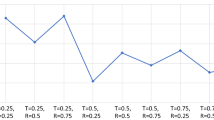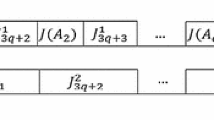Abstract
In this paper we study the no-wait or no-idle permutation flowshop scheduling problem with an increasing and decreasing series of dominating machines. The objective is to minimize one of the five regular performance criteria, namely, total weighted completion time, maximum lateness, maximum tardiness, number of tardy jobs and makespan. We establish that these five cases are solvable by presenting a polynomial-time solution algorithm for each case.
Similar content being viewed by others
References
I. Adiri and D. Pohoryles,Flowshop/on-idle or no-wait scheduling to minimize the sum of completion times, Naval Research Logistics Quarterly29 (1982), 495–504.
K. R. Baker,Introduction to sequencing and scheduling, Wiley, New York, 1974.
O. Čepek, M. Okada and M. Vlach,Nonpreemptive flowshop scheduling with machine dominance, European Journal of Operational Research139 (2002), 245–261.
M. R. Garey, D. S. Johnson and R. Sethi,The complexity of flowshop and jobshop scheduling, Mathematics of Operations Research1 (1976), 117–129.
R. L. Graham, E. L. Lawler, J. K. Lenstra and A.H.G. Rinnooy Kan,Optimization and approximation in deterministic sequencing and scheduling: a survey, Annals of Discrete Mathematics5 (1979), 287–326.
J. C. Ho and J. N. D. Gupta,Flowshop scheduling with dominant machines, Computers and Operations Research22 (1995), 237–246.
S. M. Johnson,Optimal two and three stage production schedules with setup times included, Naval Research Logistics Quarterly1 (1954), 61–68.
J. K. Lenstra, A. H. G. Rinnooy Kan and P. Brucker,Complexity of machine scheduling problems, Annals of Discrete Mathematics1 (1977), 343–362.
C. L. Monma and A. H. G. Rinnooy Kan,A concise survey of effient solvable special cases of the permutation flowshop problem, RAIRO17 (1983), 105–119.
J. M. Moore,An n job, one machine sequencing algorithm for minimizing the number of late jobs, Management Science15 (1968), 102–109.
A. V. D. Nouweland, M. Krabbenborg and J. Potters,Flow-shops with a domonant machine, European Journal of Operational Research62 (1992), 38–46.
H. Rôck,Some new results in flow shop scheduling, Zeitschrift fûr operational Research28 (1984), 1–16.
H. Rôck,The three-machine no-wait flow shop problem is NP-compulete, Journal of ACM31 (1984), 336–345.
S. Xiang, G. Tang and T.C.E. Cheng,Solvable cases of permutation flowshop scheduling with dominating machines, Int. J. Production Economics66 (2000), 53–57.
Author information
Authors and Affiliations
Corresponding author
Additional information
Partly supported by the foundation of Ph.D Units of Education Ministry (20020141013).
Ji-Bo Wang is a Ph. D candidate of Dalian University of Technology under the direction of Prof. Zun-Quan Xia. His research interests are in scheduling and discrete optimization.
Zun-Quan Xia is a professor in Department of Applied Mathematics, DUT, Dalian, China. He graduated from Fudan University, Shanghai, as a graduate student in 1968. His research areas are (smooth, nonsmooth, discrete and numerical) optimization, OR methods and applications.
Rights and permissions
About this article
Cite this article
Wang, JB., Xia, ZQ. No-wait or no-idle permutation flowshop scheduling with dominating machines. JAMC 17, 419–432 (2005). https://doi.org/10.1007/BF02936066
Received:
Revised:
Issue Date:
DOI: https://doi.org/10.1007/BF02936066




